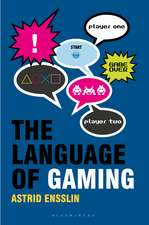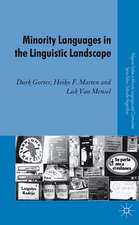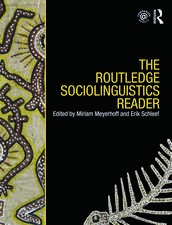Japanese Questions: Discourse, Context and Language
Autor Lidia Tanakaen Limba Engleză Paperback – 18 mai 2016
| Toate formatele și edițiile | Preț | Express |
|---|---|---|
| Paperback (1) | 257.68 lei 6-8 săpt. | |
| Bloomsbury Publishing – 18 mai 2016 | 257.68 lei 6-8 săpt. | |
| Hardback (1) | 773.39 lei 6-8 săpt. | |
| Bloomsbury Publishing – 19 noi 2014 | 773.39 lei 6-8 săpt. |
Preț: 257.68 lei
Preț vechi: 331.28 lei
-22% Nou
Puncte Express: 387
Preț estimativ în valută:
49.32€ • 51.82$ • 41.45£
49.32€ • 51.82$ • 41.45£
Carte tipărită la comandă
Livrare economică 12-26 martie
Preluare comenzi: 021 569.72.76
Specificații
ISBN-13: 9781474288088
ISBN-10: 1474288081
Pagini: 264
Dimensiuni: 156 x 234 x 21 mm
Greutate: 0.37 kg
Ediția:NIPPOD
Editura: Bloomsbury Publishing
Colecția Bloomsbury Academic
Locul publicării:London, United Kingdom
ISBN-10: 1474288081
Pagini: 264
Dimensiuni: 156 x 234 x 21 mm
Greutate: 0.37 kg
Ediția:NIPPOD
Editura: Bloomsbury Publishing
Colecția Bloomsbury Academic
Locul publicării:London, United Kingdom
Caracteristici
Gives many examples of how Japanese speakers use questions not only to obtain new information but to accomplish a range of social actions
Notă biografică
Lidia Tanaka is Senior Lecturer and Japanese Program Co-ordinator in the Japanese Program, Faculty of Humanities and Social Sciences, La Trobe University, Australia
Cuprins
List of Tables & FiguresList of Abbreviations and ConventionsList of Data Transcription ConventionsRomanization of JapaneseAcknowledgements1. Introduction2. Japanese Questions and Interrogativity3. Establishing Topics and Eliciting Talk: Questions in Television Interviews4. Information Collection and Footing: Questions in Radio Phone-in Programs5. Nourishing the Friendship: Questions in Friends' Talk6. Categorizing, Introducing and Maintaining Topical Talk: Questions in Unacquainted Interactions7. Questions in Japanese Discourse: Discussion and ConclusionReferences Index
Recenzii
Japanese Questions presents an original, well-researched and fascinating exploration of discourse and social context. It provides fresh insights into the use of questions in Japanese through a wide range of examples and sophisticated analysis.
This book presents groundbreaking new work on an unusual array of question types in contemporary Japanese -- ones that have not been previously well-explored or even included in prescriptive descriptions of Japanese grammar.With exquisite skill, Dr Tanaka unravels the social and cultural motivations behind the use of non-canonical interrogatives such as the grammatically unfinished, the elliptical and the half questions, the latter characteristic of young people's language. Crucially, her discourse data are taken from real interaction recorded from television and telephone interviews, or during radio phone-in programmes and in conversations between friends as well as between unacquainted persons. Japanese Questions is certain to impact with force on received views about interrogativity.
This wonderful study is a clear and insightful analysis of questioning strategies in Japanese, based on a substantial corpus of real data from television interviews, radio talk-back and casual conversation among friends and between strangers. Like the 2004 book by the same author, Gender Language and Culture, it uses modern discourse analysis techniques to improve our understanding of the syntactic, pragmatic and cultural factors in Japanese interaction. It develops new insights into the use of reciprocating questions, half-questions and other forms of questioning, and makes an important contribution to work in discourse analysis as well as to our knowledge of these phenomena in contemporary Japanese.
This book presents groundbreaking new work on an unusual array of question types in contemporary Japanese -- ones that have not been previously well-explored or even included in prescriptive descriptions of Japanese grammar.With exquisite skill, Dr Tanaka unravels the social and cultural motivations behind the use of non-canonical interrogatives such as the grammatically unfinished, the elliptical and the half questions, the latter characteristic of young people's language. Crucially, her discourse data are taken from real interaction recorded from television and telephone interviews, or during radio phone-in programmes and in conversations between friends as well as between unacquainted persons. Japanese Questions is certain to impact with force on received views about interrogativity.
This wonderful study is a clear and insightful analysis of questioning strategies in Japanese, based on a substantial corpus of real data from television interviews, radio talk-back and casual conversation among friends and between strangers. Like the 2004 book by the same author, Gender Language and Culture, it uses modern discourse analysis techniques to improve our understanding of the syntactic, pragmatic and cultural factors in Japanese interaction. It develops new insights into the use of reciprocating questions, half-questions and other forms of questioning, and makes an important contribution to work in discourse analysis as well as to our knowledge of these phenomena in contemporary Japanese.











